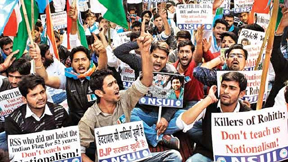 LONDON: Authorities in India failed to stop “incidents of religious violence” and often “contributed to tensions through polarizing speeches”, Amnesty International said today, as it condemned “growing intolerance” that led to attacks on journalists, authors, artists and rights activists.
LONDON: Authorities in India failed to stop “incidents of religious violence” and often “contributed to tensions through polarizing speeches”, Amnesty International said today, as it condemned “growing intolerance” that led to attacks on journalists, authors, artists and rights activists.
The London-based rights body in its annual report for 2015-16 warned against worldwide assault of freedoms with many governments “brazenly” breaking international law, including an “intensified crackdown on key freedoms” in India.
“Scores of artists, writers and scientists returned national honors in protest against what they said was a climate of growing intolerance,” the report said on India.
“Authorities clamped down on civil society organizations critical of official policies, and increased restrictions on foreign funding. Religious tensions intensified, and gender and caste-based discrimination and violence remained pervasive. Censorship and attacks on freedom of expression by hardline Hindu groups grew,” it added.
Aakar Patel, Executive Director of Amnesty India, said: “In 2015, India saw several backslides on human rights. The government intensified restrictions on civil society organizations…”
“What is heartening is that there has been opposition to the erosion of rights. The widespread outrage around incidents of religious intolerance, a Supreme Court ruling striking down an oppressive law on free speech online, the many public protests against ill-conceived reforms to land acquisition laws – these offer hope that 2016 can be a better year for human rights in India.”
Amnesty rebuked Indian authorities for “failing to prevent many incidents of religious violence, and sometimes contributing to tensions through polarizing speeches and pervasive caste-based discrimination and violence”.
“There were several instances of intimidation and attacks against journalists, authors, artists and human rights defenders by religious and caste-based groups. Two rationalist writers were killed in attacks thought to be related to their criticism of religious intolerance and idolatry.”
Laws which did not meet international standards on freedom of expression were used to persecute human rights defenders and others, the report said.
It also highlighted “restrictive foreign funding laws” being used to repress NGOs critical of the government.
The government took a series of actions against Greenpeace India, including preventing one of its campaigners from travelling to the UK in January, ordering the organization’s bank accounts to be frozen in April and cancelling its Foreign Contribution (Regulation) Act (FCRA) in September. High Courts ruled that some of these steps were illegal.
The Ministry of Home Affairs cancelled the FCRA registration of thousands of NGOs for violating provisions of the law. In April, the Ministry ordered that it would have to approve foreign funds from certain identified donor organizations.
There was some progress when the lower house of Parliament passed an amendment to the Scheduled Castes and the Scheduled Tribes (Prevention of Atrocities) Act, recognizing new offences and requiring that special courts be established to try them, and stipulating that victims and witnesses receive protection, it said.
In reference to violence against women, it said: “Although nearly 322,000 crimes against women, including over 37,000 cases of rape, were reported in 2014, stigma and discrimination by police officials and authorities in India continued to deter women from reporting sexual violence, and most states still lacked standard operating procedures for the police to address violence against women.”
In a positive move, the Supreme Court directed states to install closed-circuit television in all prisons to prevent torture and other violations, while the government stated it was considering amending the Penal Code to specifically recognize torture as a crime, it noted.
In another positive development, it lauded a historic peace framework agreement reached in Northeastern India between the government and the “influential armed group National Socialist Council of Nagaland (Isak-Muivah faction)”.
Globally, Amnesty International warns of an insidious and creeping trend undermining human rights which has come from governments deliberately attacking, under-funding or neglecting institutions that have been set up to help protect our rights.
“Your rights are in jeopardy: they are being treated with utter contempt by many governments around the world. Millions of people are suffering enormously at the hands of states and armed groups, while governments are shamelessly painting the protection of human rights as a threat to security, law and order or national ‘values’,” said Salil Shetty, Secretary General of Amnesty International.–PTI





